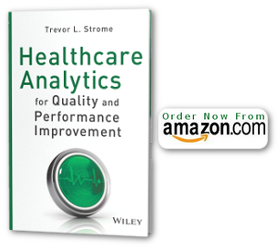 The analytics talent shortage
The analytics talent shortage
Is the potential of analytics to support change within your healthcare organization (HCO) being limited by a lack of knowledgeable and skilled analytics professionals?
A recent article in the Wall Street Journal suggests that the use of analytics within organizations (not just healthcare) is, and will continue to be, constrained by a lack of talent. Citing a report published by McKinsey, a “significant constraint on realizing value from Big Data will be a shortage of talent.” The article cites projections that there will be a need for 1.5 million more “managers and analysts … who can ask the right questions and consume the results” of analytics effectively. There was no estimate of what proportion of these managers and analysts will be required in healthcare-specific domains. There is no question, however, that healthcare organizations are requiring many analytics professionals as advances in healthcare information technology (HIT) have resulted in a massive increase in the volume and complexity of healthcare data.
This impending shortage of analytics professionals in healthcare will mean that healthcare organizations may be unable to fully leverage the data available to gain the deep insight into clinical and business operations that might normally be possible. This then could result in failure to achieve the transformational changes necessary to truly improve healthcare quality and patient safety.
The “Analytics Gap” in Healthcare
In my article The Analytics Gap in Healthcare, I state that, “many healthcare managers and executives have a basic understanding of statistics and can build simple reports, but they may not have the analytical skills beyond building spreadsheets and pie graphs.” This will result in HCOs becoming “data rich but information poor.”
Symptoms of an “analytics gap” include:
- Quality improvement (QI) objectives not being met despite multiple QI initiatives
- Major decisions being made without supporting data, or with the “same old” reports
- Accurate, timely, and readily available information not making it to all levels within the HCO
Healthcare analytics professionals – skilled, and hard to find
Healthcare analytics professionals (or “data scientists” as analytics professionals are starting to be called in some circles) are truly multi-skilled, which makes good ones especially difficult to find. Analytics professionals in healthcare may come from many backgrounds (Epidemiology, Engineering, Computer Science, Business, etc). They typically have a basic understanding of database technology (both traditional relational databases and new “big data” formats). Analytics professionals should be proficient in sophisticated statistical modeling and analysis, simulation techniques, and data visualization. Ideally, they have an understanding of the healthcare domain (or even specialty areas such as Surgery, Emergency Medicine, etc). In reality, most healthcare analytics professionals are passionate about healthcare and improving it.
Building and keeping analytics teams
Because talented healthcare analytics professionals are hard to keep, HCOs should do all they can to keep them around. My recent article Creating Great Healthcare Teams outlines some success factors in forming analytics teams and keeping them together, and highlights the risks that even well-functioning teams can fall victim to.
There is no doubt that healthcare is entering an exciting era in the use of analytics to improve the efficiency and effectiveness of healthcare. One challenge that will need to be overcome is the recruitment and/or development of the analytics professionals in healthcare who will help turn the analytics “gap” into analytics potential.

{ 0 comments… add one now }
{ 1 trackback }